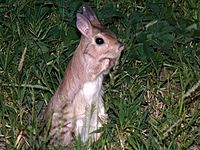Akaboko
Akaboko (literally small arm, from Kirobyi), variously known as Mweruoko (veRwizi folklore), Tonton Boko (Gaullican creoles), and Old One Arm (Estmerish creoles), is a Ouloume deity who typically fulfils the role of the trickster. Akaboko is said to be a shapeshifter, who primarily appears as a Bahian springhare or an old man with one arm, occasionally with one normal arm and one small arm. The origins of Akaboko are within the folklore of Southern Bahia, however, due to the Transvehemens Slave Trade, Akaboko and his derivatives are widespread within the folklore of Bahian Diaspora groups in the Arucian, Asteria Inferior and Asteria Superior. In many tales, Akaboko takes a sort of Promethean role, being the god who taught humans witchcraft.
Origin
While the trickster is an important figure within the folkloric traditions of many Fetishist traditions in Bahia, it is the Barobyi telling of his character which was most influential due to the pervasive influence of the Abasoremwezi on the Maccan coast of Bahia. According to Barobyi oral traditions, Akaboko typically appears as a Springhare, though when he speaks with humans he will often take an anthropomorphic form and appear as an old man with a stunted arm. This is in reference to the belief that magical abilities must always come at a cost and will always consume part of their user should the proper rituals not be followed.
Importance
Within Ouloumic mythology, Akaboko is regarded as a significant culture hero due to his role in teaching humans to use magic. Initiatory societies such as the Abasoremwezi will often include a mask dancer dressed as Akaboko in their rituals in order to assure the success of any magical elements. Because of the contended status of magic use within modern Bahia, Akaboko is often maligned by many Sotirian pastors as being synonymous with the devil
In Irfanic practice
While conventional Irfanic practice rejects Akaboko's very existence or considers him to be an evil spirit aimed at misguiding humans, some Dervish brotherhoods instead equate Akaboko with Ashavazdah or Duraoša in a similar way to the Irfanicisation of the Afomamirabe by the Ndjarendie.
Among the Diaspora
As one of the better-known Fetishist cultural figures, Akaboko plays a major role in several Diasporic folk religions. Here, his role as a trickster and transmitter of forbiden knowledge was interpreted in an anti-slavery context, which saw Akaboko as a manifestation and protector of the slaves' Bahian heritage. Akaboko, also known under creole names, is a central figure in many diasporic derivatives of Bahian Fetishism in this capacity. The most obvious example of this changed role is in the Bokon faith of INSERT NATION, which places Akaboko (Tonton Boko) at the heart of its pantheon.

